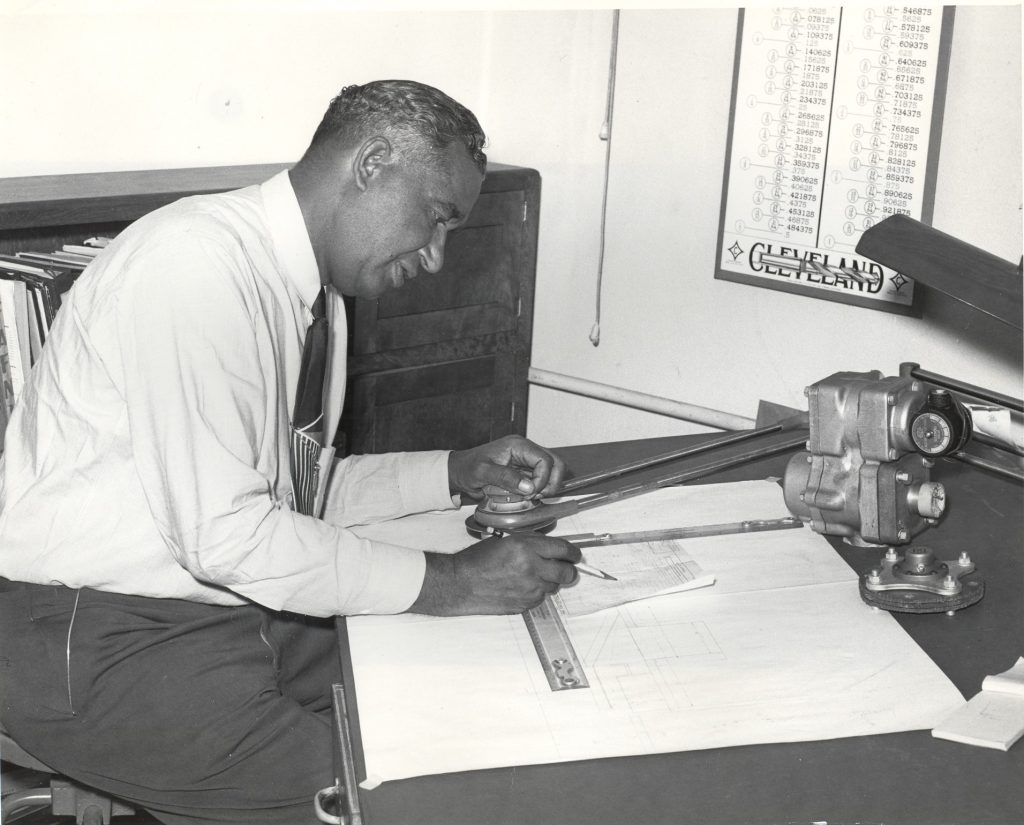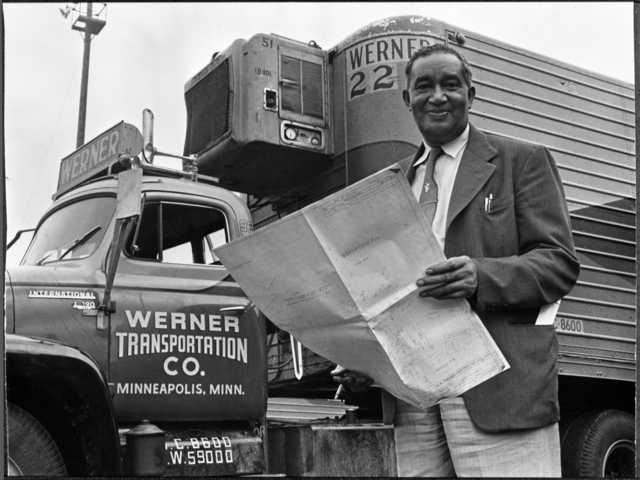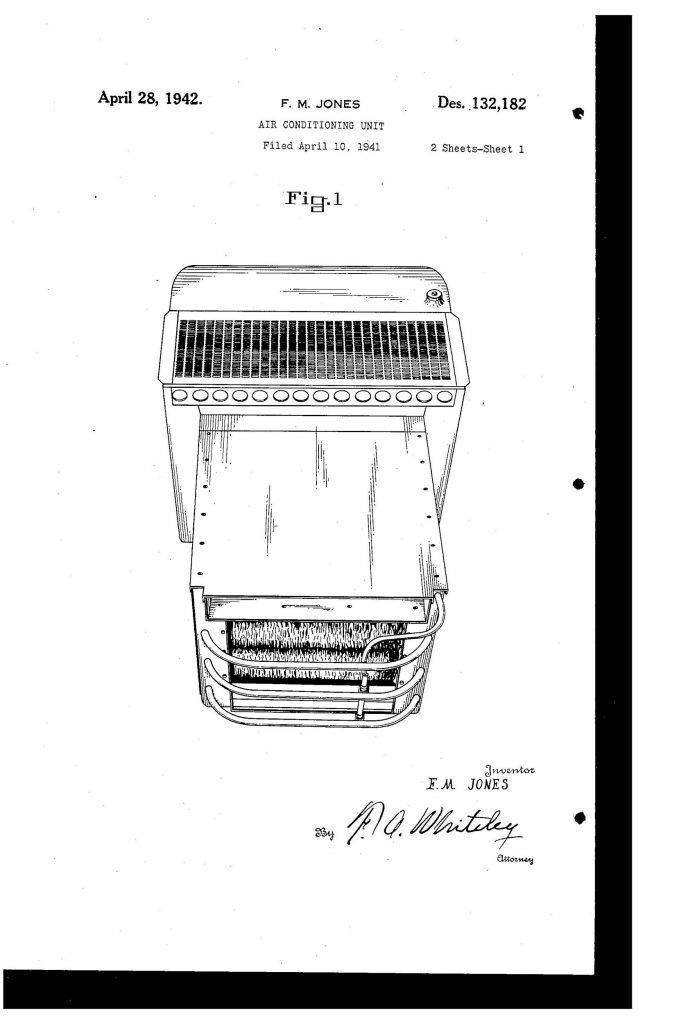InTrans / May 21, 2018
Frederick McKinley Jones: Refrigeration engineer
Go! Magazine
 posted on May 21, 2018
posted on May 21, 2018
This month we’re talking about inventors who brought their unique talents and gifts to the world of transportation. Our next inventor, Frederick McKinley Jones, was elected into the American Society of Refrigeration Engineers and awarded the National Medal of Technology. He was the first African American to receive both honors and has been called “one of the most prolific Black inventors ever.”
Jones became an inventor after a challenging childhood. The young innovator taught himself a variety of trades, including mechanical and electrical engineering. Over the course of his career, Jones received more than 60 patents—most of them related to refrigeration technology, but others pertaining to x-ray machines, engines, and sound technology. Like many of our other highlighted inventors, Jones was a jack of many trades.
Inventor profile: Frederick McKinley Jones
Frederick McKinley Jones was born in Cincinnati, Ohio, and experienced a challenging childhood. His mother deserted him at a young age and his father died a few short years later. At the age of 11, Jones was fending for himself. He worked in Cincinnati doing a variety of odd jobs, including janitorial work in a garage where he learned the ins and outs of automobile mechanics.
Jones became a full mechanic by age 14, and by the age of 19 had built several cars and become a well-known racer in the Great Lakes Bay region. By the age of 20, Jones earned an engineering license in Minnesota, where he had moved by 1912, and had been hired to do mechanical work on a farm. His talent for mechanics was apparent to all those around him, and he spent countless hours educating himself in his spare time in addition to his regular work.

During World War I, Jones served as a sergeant in the U.S. Army and an electrician, where he rewired his camp for electricity, telephone, and telegraph services. With his experience as a mechanic, he was often called on to make repairs to machines and other equipment.
Expert engineer
Jones brought his expert skillset to dozens of different fields of work.
After World War I, Jones returned to the farm in Minnesota, where he educated himself further in the realm of electronics. When the nearby town decided to fund a new radio station, Jones was able to build the transmitter that was needed to broadcast programming.
Jones also developed a device that was able to combine moving pictures with sound. Subsequently, Joseph A. Numero, a sound producer for the film industry, hired Jones to help him improve his work. He also developed a device that would deliver tickets and return change to customers at movie box offices.
World War II efforts
Jones invented everything from snowmobiles to machines that improved the entertainment industry to portable cooling units for trucks transporting perishable food—his most noted innovation.

In the 1930s, Jones designed and patented a portable air-cooling device for trucks transporting food. Jones then founded the U.S. Thermo Control Company with Numero and later adapted his portable, air-cooling device to fit trains and aquatic vehicles. His invention allowed perishable food to be transported around the world: “mobile refrigeration was born.”
When he invented mobile refrigeration, Jones changed the way we transported food, and it continues to impact our lives today. He changed the way we eat, because now we can get fresh produce during any season of the year in the United States and other parts of the world. Bringing refrigeration to the transportation world allowed for things like fruit—something that used to be seasonal—to be transported across the world.
And Jones’ device allowed for other necessities to be transported during times of need (like during wartime). Jones’ air-cooling device changed the course of World War II, because it was used to preserve blood, medicine, and food for US troops. His innovation was critical in storing blood serums for blood transfusions. By 1949, the U.S. Thermo Control Company was worth millions of dollars and had created a life-saving legacy.
A lasting legacy
Jones was recognized for his achievements both during his life and afterward. In 1944, Jones was the first African American elected to the American Society of Refrigeration Engineers. He died in 1961, however, people continue to recognize his achievements.

In 1991, Jones was awarded the National Medal of Technology by President George H. W. Bush. Although he was not there to receive the award, his wife attended the ceremony that was held at the White House Rose Garden. Although he was not alive to see it, Jones was the first African American to receive this prestigious award. He was also inducted into the Minnesota Inventors Hall of Fame in 1977.
Jones maintains his status as a highly regarded, intelligent, African American inventor and continues to be recognized for his work. He was a multi-disciplinary, diversely talented inventor that brought life to his fantastic ideas.
References
www.blackpast.org/aah/jones-frederick-mckinley-1893-1961
blackthen.com/legacy-black-inventor-frederick-mckinley-jones-refrigeration-cinema-industries/
www.biography.com/people/frederick-jones-21329957
www.myblackhistory.net/Frederick_Jones.htm
www.fundinguniverse.com/company-histories/thermo-king-corporation-history/
www.youtube.com/watch?v=Kx2x0W79cz4
Related links
(Video) Frederick McKinley Jones – American Inventor: www.youtube.com/watch?v=Kx2x0W79cz4
(Patent) Jones air condition unit: patents.google.com/patent/USD132182S/
By Hannah Postlethwait, Go! Staff Writer